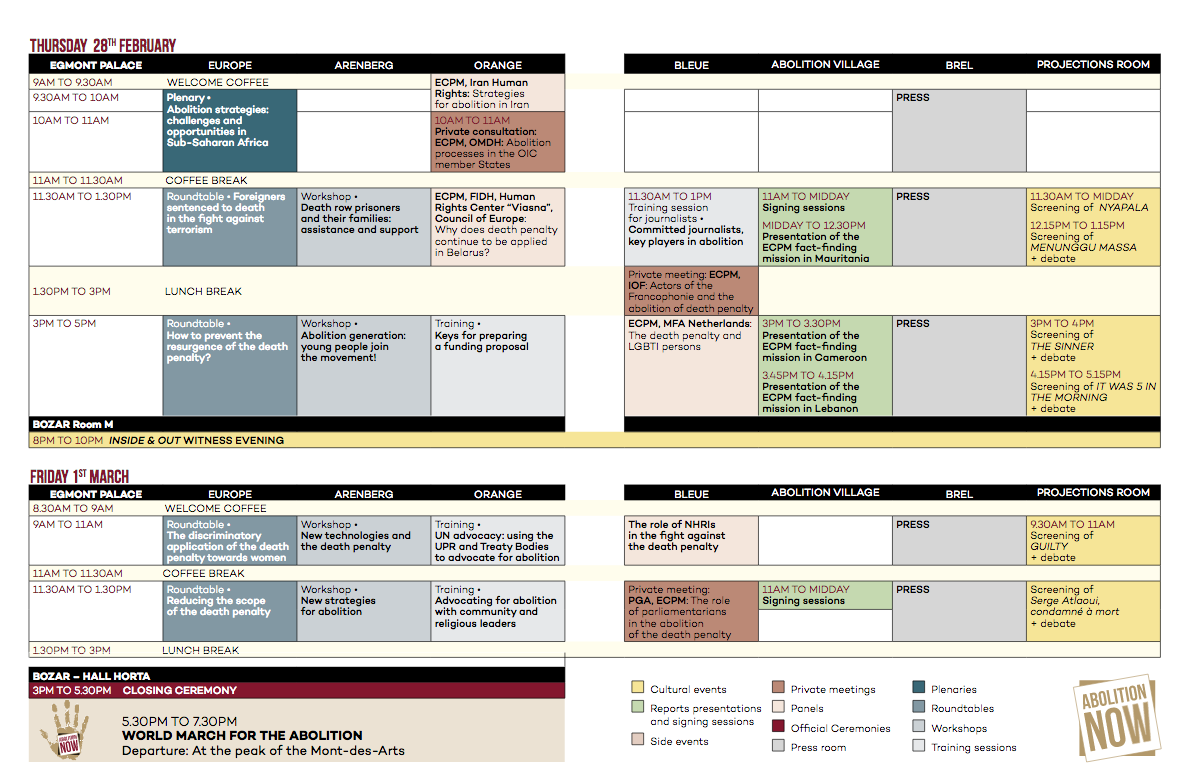Preface
“Conscience is the light of intelligence used to distinguish good from evil.”
Confucius
The fight to abolish the death penalty transcends divisions and crosses continents and cultures. It unites what separates us and for this reason it is both unique and essential.
Violent impulses and the desire for vengeance have certainly influenced the course of history, but societies that abolished the death penalty have also marked it by their desire to build peace and tolerance. In addition, they have never taken a step back, knowing that to do so would betray later generations. Grounded in human rights, the struggle for abolition articulates a human aspiration that is several centuries old: to end sanctions against the fundamental right to life. To assault this right is to assault humanity and what it is to be human. This truth, the majority of States and the majority of citizens have now understood. Two thirds of countries voted in favour of the last UN resolution calling for a moratorium on executions – four fifths if one includes countries that were absent from the vote or abstained. The World Congress draws its energy from the universal desire for abolition which, in the words of Confucius, separates ‘good from evil’.
1500 participants from 100 countries took part in the Brussels Congress.
In Oslo, now in Brussels, the World Congresses succeed each other, bearing witness to the drive for abolition. We give a voice to those who have experienced the horrors of the death penalty (those who have been condemned, their families and lawyers) and to those who every day struggle to end it (government officials, parliamentarians, human rights activists).
For eighteen years, the World Congresses have given an opportunity to all abolitionists to come together to prepare the next phase of campaigning. Each Congress breaks new ground, brings the issue to the attention of a new public. In Madrid in 2013, we appealed to parliamentarians. In Oslo in 2016, we engaged for the first time with national human rights institutions.
A new debate with the private sector
This year, in Brussels, we began a debate with the private sector and business. The opening session of the Congress included a first exchange on the economic sphere. There is immense potential for strategic cooperation between business and abolitionists. It is vital to make sure that the abolition of the death penalty, and more generally the protection of civil and political rights, is not a secondary issue when business and human rights are discussed, notably during the annual forum on Business and human rights in Geneva.
Will Africa be the next continent to abolish the death penalty?
We also gave attention to Africa, which has made significant progress towards abolition, while experiencing important resistances. Will it be the next continent to abolish the death penalty? We fervently hope so. To ensure that States mobilized fully, we organized a preparatory conference in Abidjan in April 2018. Africa’s strong presence in Brussels was opportune because negotiations to revise the Cotonou Agreement (ACP) between the EU and Africa, the Caribbean and the Pacific Group of States have also just started.
Spreading knowledge and innovative strategies for abolition
The Acts of each Congress help to spread knowledge and research on abolition. They disseminate beyond the Congress major debates within the movement and give birth to emerging strategies. Brussels addressed many new fields of activity, including women and the death penalty, new strategies, and the thorny question of terrorism. Hugo Pratt put these words into the mouth of his hero, Corto Maltese: “Vengeance will never restore a lost friend”. Nothing can bring back to life a loved one, not even the execution of his or her killer. Capital punishment is not a zero sum game; it adds suffering on suffering. This reflection should give food for thought to all those who seek justice and peace of mind.
ECPM’s involvement in the issue of jihadists in Iraq and Syria who have been condemned to death (or might be) draws on this logic. Not to see it is to deny the values of the abolition movement. We must stand for our values even (and especially) in the most difficult situations, which touch us most nearly. Our response to terrorism is of this kind. Terrorists set a trap for us. They want us to do wrong. It is for us to refuse.
From politikos to politeia avoiding politike.
The term ‘politics’, borrowed from ancient Greek, carries at least three different meanings. It refers broadly to the political community (the city, politikos), more narrowly to the organization of political institutions (politeia), and thirdly and most exactly to the art of exercising power, to personal competition and the struggle for power (politike). To avoid falling into perverted expressions of power, the city must profoundly sanitize its institutions around the principle of universal justice. The Congresses remind us to think of politics in terms of courage and commitment. Nelson Mandela said that “courage was not the absence of fear, but the triumph over it”. Abolition is often achieved because a Head of State is courageous, or a Parliament shows political will. The abolitionist cause gives us an opportunity to reflect on how power is exercised, on its capacity to protect dignity and respect the person, on the limitations of human beings and the institutions that human societies create. All of us are fallible, in democracies and even more in States that are authoritarian. The power over life and death should never be left in the hands of rulers with limitless authority, or delegated to the sometimes random mechanisms of justice systems that are never infallible. It should never be surrendered to the instinctual vengeance and passion of mob justice.
The presence of so many political actors prepared to move together towards abolition is a sign of profound change. 1500 participants from 100 countries took part in the Brussels Congress, including politicians, diplomats, lawyers, scholars and activists from 150 NGOs. The four day programme was richer than ever before: two official ceremonies, a hundred hours of discussion, 35 debates, round tables and workshops, two plenary meetings, 50 artists, 17 cultural events, seven film projections, four cultural evenings, five art exhibitions…
Unprecedented political mobilization
The presence of 350 political personalities, including 25 Ministers and VIPs, more than half of whom came from non-abolitionist States, shows the scale of political mobilization that the Congress achieved. It made a major political statement in support of abolition. Numerous countries and institutions were present at senior level. The European Union was represented by the High Representative of the Union for Foreign Affairs and Security Policy, Frederica Mogherini, the European Parliament by its Vice-President, Pavel Telička, joined representatives from the Kingdom of Belgium, the Swiss Confederation, the Kingdom of Norway, the Principality of Monaco, the Republic of Bulgaria and the Republic of Belarus (the only non-abolitionist country on the continent of Europe), and many personalities and officials from abolitionist and non-abolitionist countries outside Europe: the Republic of Cabo Verde, the Republic of Gambia, the Republic of Guinea, the Republic of the Congo, Burkina Faso, the Republic of Kenya, the Republic of Benin, the Kingdom of Eswatini, the Kingdom of Lesotho, the Republic of Uganda, the Republic of Zambia, the Republic of Tunisia, the Kingdom of Morocco, Mongolia, the Democratic Socialist Republic of Sri Lanka and the United States of America.
In addition, messages from António Guterres, the UN Secretary General, Michelle Bachelet, the UN High Commissioner for Human Rights, Louise Mushikiwabo, the Secretary General of the International Organization of the Francophonie (OIF), as well as His Holiness Pope Francis, underlined the depth of international commitment to universal abolition of the death penalty.
“Progress towards abolition of the death penalty is one of the great success stories of human rights. When the Universal Declaration was adopted 70 years ago, only ten countries had abolished the death penalty. Today, some 170 States with a variety of legal systems, traditions, cultures and religions have either abolished the death penalty in law or do not carry out executions in practice.”
Michelle Bachelet
UN High Commissioner for Human Rights


